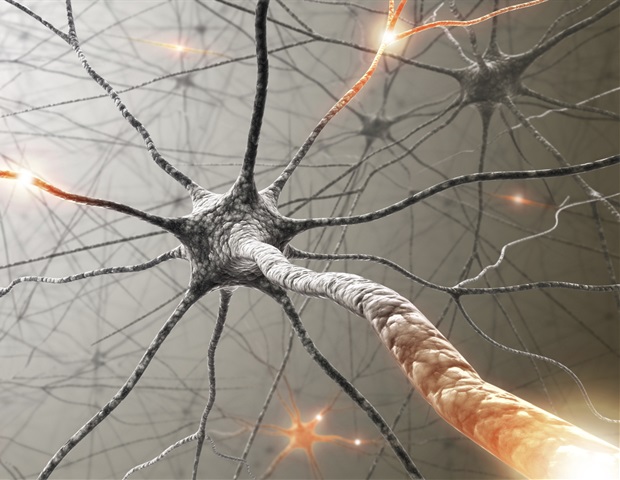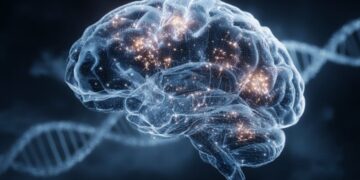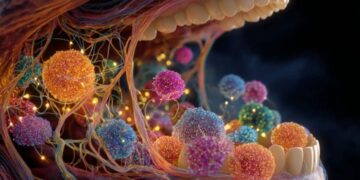Summary: A new study reveals that while the ketogenic diet may prevent weight gain, it can cause serious long-term metabolic problems. Researchers found that mice on a long-term ketogenic diet developed fatty liver disease and impaired blood sugar regulation due to stress on pancreatic cells.
These problems were especially pronounced in men, although women showed partial resistance to fat accumulation in the liver. The findings highlight the need for caution and medical supervision before adopting keto for long-term use, as some negative effects may be reversed after stopping the diet.
Key facts:
Metabolic strain: Long-term keto increased fat accumulation in the liver and altered insulin secretion. Sex differences: Male mice developed more severe fatty liver disease than females. Reversible effects: Some metabolic problems improved after stopping the diet, offering hope for recovery.
Source: University of Utah
A study published in Science Advances by health researchers at the University of Utah sheds light on the long-term effects of the ketogenic diet, raising important questions about its safety and effectiveness in improving metabolic health.
While the ketogenic diet was historically used to treat epilepsy, it has recently gained popularity for weight loss and management of conditions such as obesity and type 2 diabetes.
The new study, conducted in mice, shows that diet can have potentially dangerous impacts on metabolic health, including how the body processes fats and carbohydrates.
A ketogenic diet is a very high-fat, very low-carbohydrate diet that was originally used to treat epilepsy. The idea is that the ketogenic diet induces ketosis, a metabolic state that produces ketone bodies, which act as alternative brain fuel, stabilizing neuronal activity and reducing seizures.
In this way, the diet mimics starvation, where reduced glucose availability also limits seizures, while ketones derived from fat provide the main source of energy for the brain.
Over time, the diet has also been promoted for weight loss and improved metabolic health, but most studies have focused on short-term results.
“We’ve seen short-term studies and those that just look at weight, but there really aren’t any studies that look at what happens long-term or with other facets of metabolic health,” said Molly Gallop, PhD, now an assistant professor of anatomy and physiology at Earlham College, who led the study as a postdoctoral fellow in nutrition and integrative physiology at U of U Health.
To address this gap, Gallop and his colleagues conducted a long-term study in mice, placing adult men and women on one of four diets: a high-fat Western diet, a low-fat, high-carbohydrate diet, a classic ketogenic diet where almost all calories come from fat, and a low-fat diet with protein. The mice were allowed to eat as much as they wanted for nine months or more.
Throughout the study, the team monitored body weight, food intake, blood fat profiles, liver fat accumulation, and blood sugar and insulin levels. They also investigated which genes were active in the pancreatic cells that produce insulin. Finally. They used advanced microscopy to uncover the cellular mechanisms underlying the observed metabolic changes.
The ketogenic diet successfully prevented weight gain in both sexes compared to the high-fat Western diet. Mice on the ketogenic diet maintained significantly lower body weights, and the weight gain was primarily attributed to increased fat mass rather than lean mass.
Despite this apparent benefit, mice fed a ketogenic diet developed serious metabolic complications, with some changes beginning within days.
“One thing that is very clear is that if you have a very high-fat diet, the lipids have to go somewhere, and they usually end up in the blood and liver,” said Amandine Chaix, PhD, assistant professor of nutrition and integrative physiology at U of U Health and senior author of the study.
The accumulation of fat in the liver, known as fatty liver disease, is a hallmark of the metabolic disease associated with obesity.
“The ketogenic diet was definitely not protective in the sense of fatty liver disease,” Chaix added.
The researchers observed notable differences in how male and female mice responded to the ketogenic diet: males developed severe fatty liver and had worse liver function, a key marker of metabolic disease, while females did not have significant fat accumulation in the liver. The scientists plan to explore in future research why the female mice did not get fatty liver disease.
The study also revealed a paradox in blood sugar regulation. After two to three months of the ketogenic diet, the mice had low blood sugar and insulin levels.
“The problem is that when you give these mice a little bit of carbohydrate, their response to the carbohydrate is completely skewed,” Chaix said. “Your blood glucose level goes up a lot for a long time, and that’s pretty dangerous.”
The researchers found that the mice could not properly regulate their blood sugar because the pancreas cells did not secrete enough insulin. Likely due to chronically high levels of fat in their environment, the pancreas cells showed signs of stress, unable to move proteins as they should.
Researchers believe that impaired blood sugar regulation is caused by this cellular stress, but identifying the exact mechanism is a future research direction.
Importantly, the problems with blood sugar regulation were reversed when the mice were stopped from the ketogenic diet, suggesting that at least some metabolic problems may not be permanent if the diet is stopped.
While mice and humans differ, the findings reveal negative long-term metabolic health risks that people considering the ketogenic diet should be aware of. “I urge anyone to talk to a healthcare provider if they are thinking about following a ketogenic diet,” Gallop cautioned.
Funding: This work was supported by the National Institutes of Health, including the National Institute on Aging (grant number R01AG065993), the National Institute of Diabetes and Digestive and Kidney Diseases (grant numbers P30DK020579, F32DK137475, T32DK110966, DK108833, and DK112826), the Institute National Heart, Lung, and Blood Institute (grant number HL170575) and the National Cancer Institute (grant number R01CA222570).
The work was also supported by the Damon Runyon-Rachleff Innovation Award (DR 61-20) and the American Cancer Society (RSG-22-014-01-CCB). The content is the sole responsibility of the authors and does not necessarily represent the official views of the National Institutes of Health.
Key questions answered:
A: The diet prevented weight gain, but caused fatty liver disease, insulin secretion problems, and poor blood sugar regulation in mice after several months.
A: They reveal that the metabolic impact of the ketogenic diet may worsen over time, highlighting potential long-term health risks that short-term studies miss.
A: Some problems reversed after the mice stopped the diet, suggesting that, although harmful, the effects may not be irreversible.
About this news about diet, metabolism and health research.
Author: Sofia Friesen
Source: University of Utah
Contact: Sophia Friesen – University of Utah
Image: Image is credited to Neuroscience News.
Original research: Open access.
“A long-term ketogenic diet causes hyperlipidemia, liver dysfunction, and glucose intolerance due to impaired insulin secretion in mice” by Molly Gallop et al. Scientific advances
Abstract
A long-term ketogenic diet causes hyperlipidemia, liver dysfunction and glucose intolerance due to impaired insulin secretion in mice
Ketogenic diets (KDs), very low in carbohydrates and very high in fat, have gained popularity as therapeutics against obesity and type 2 diabetes. However, their long-term effects on metabolic health remain poorly studied.
Here, we show that, in male and female mice, a KD protects against weight gain and induces weight loss, but over time leads to the development of hyperlipidemia, hepatic steatosis, and severe glucose intolerance.
Unlike mice on a conventional high-fat diet, KD-fed mice remain insulin sensitive and show low insulin levels. Ex vivo glucose-stimulated insulin secretion and hyperglycemic clamp assays revealed systemic and cell-intrinsic alterations in insulin secretion.
Transcriptomic profiling of islets from KD-fed mice indicated endoplasmic reticulum (ER)/Golgi stress and disrupted ER-Golgi protein trafficking, which was confirmed by electron microscopy showing a dilated Golgi network consistent with defective insulin granule trafficking and secretion.
Taken together, these results suggest that long-term KD leads to multiple aberrations of metabolic parameters that caution its systematic use as a health-promoting dietary intervention.




















